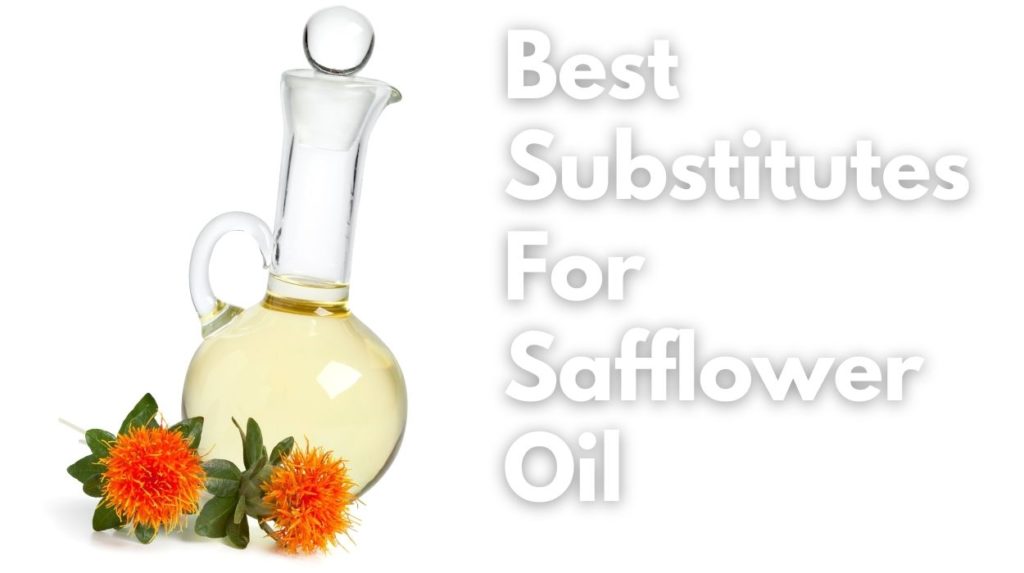
Safflower oil is one of the healthiest oils due to its high nutritional value. Since it is rich in unsaturated fats, people use this to control their weight and reduce inflammation. Moreover, owing to its unobtrusive taste, it is often added to dishes without worrying about transferring its taste or aroma.
However, since it has a strong nutritional profile, it can be difficult to find its perfect substitute. Nonetheless, whenever you run out of it, you can use sunflower oil, soyabean oil, olive oil, etc.
Since safflower oil is used in cooking, baking, soap-making, preparing dog food, etc., we have provided replacement options for all cases. Read along and pick out the best safflower substitute.
What is Safflower Oil?
Before we get to the substitutes, it is best to define the nutritional content and benefits of safflower oil to help choose the best substitute.
Similar to other seed oils, safflower oil is obtained from safflower oils. It is refined to remove CLA, Vitamin E, and the oil flavor.
It has a mild taste and aroma with high heat tolerance (475 to 500°). This makes it suitable for deep-frying and sautéing.
It contains zero sugar or carbohydrates. 77% of the nutrients of safflower oil are just oleic and linoleic acids.
Safflower oil’s nutritional composition helps prevent heart diseases, fever, coughs, chest pain, tumors, etc.
Safflower oil is added to cosmetic products because it brings positive results to the skin. It adds essential proteins to your hair, thereby guaranteeing proper moisturization and hair growth.
Along with that, you can add safflower oil to your dog’s food. This shall promise healthier skin and a shinier coat for your pup.
15 Best Safflower Oil Substitutes
Along with the substitutes, we have also mentioned the best possible scenarios for using the said replacements along with the substitutes. This will make it easier for you to make a decision.
1. Sunflower Oil

Sunflower and safflower oil are quite similar. Since both types of oil have a high smoke point, you can use sunflower oil in place of safflower oil for deep-frying.
Moreover, sunflower oil has a neutral taste with hints of a nutty flavor. This makes it easier to incorporate it into your cooking without changing the dish’s overall taste.
If deep-frying gets too unhealthy for you, you can also use sunflower oil for stir-frying or sautéing. Furthermore, it works well with baking cookies, muffins, cakes, bread, etc. You can prepare shortenings and margarine made with sunflower oil to replace butter in baking.
The health factor is taken into consideration while choosing this substitute since it helps with heart health and immunity. Not only does it improve digestion, but you can also use sunflower oil to improve the quality of your hair and skin.
Use it in the same proportion as that of safflower oil, and you shall not feel any difference in terms of taste, aroma, or texture.
Best for Cooking, Skincare, Haircare, and Baking
2. Soybean Oil

Soybean oil comes from the seeds of soybeans. It is considered to be a drying oil since it becomes tough, elastic, and hard when exposed to air. Due to such a feature, soybean oil is used in oil paints, printing inks, and varnishes.
But now, we are going to return to the cooking aspect of soybean oil.
With a hot smoke point of 495 °F, soybean oil is quite versatile in cooking. With its neutral and mild taste, you can substitute safflower oil with it in deep-frying, roasting, sautéing, etc. It also works well as a salad dressing by mixing it with vinegar, salt, and pepper.
Since bakeries use it as a shortening, you can use soybean oil to make healthy cakes, bread, cinnamon rolls, etc. This is due to its rich nutritional composition with fewer calories and saturated fat.
It supports bone health, reduces cholesterol, improves immunity, and enhances brain functionality.
Apart from that, you can use soybean oil as a natural moisturizer for your skin and hair.
Best for Cooking, Skincare, Healthcare, and Baking.
3. Olive Oil
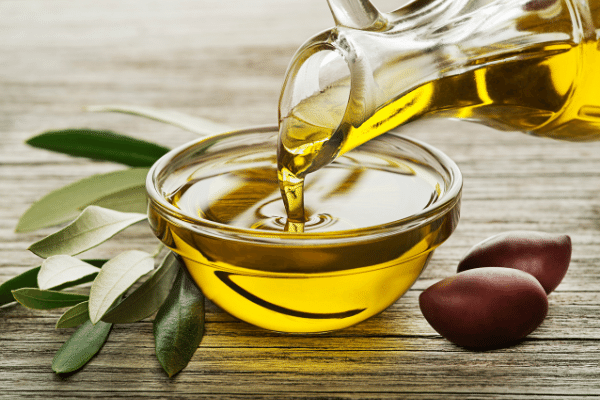
Olives might be the Mediterranean region’s traditional crop, but due to their rich nutritional composition, it is available all around the globe. Olive oil comes from the very same olive tree by pressing the whole olives.
Just like safflower oil, the use of olive oil is manifold. With its high smoke point (374–405°F), you can use this oil for pan-frying. If you opt for extra-virgin olive oil, which would also be our first preference, you can use it for all kinds of cooking methods.
You can put olive to good use in terms of cooking and making soaps. Let’s talk about it individually.
Olive oil can be used as a salad dressing due to its fruity flavor. Apart from that, you can drizzle some over your pasta, add it to your sauces for vegetables and meat, and work it as a dip for bread.
It is best to add it towards the end of your cooking to make the best of its flavors and aroma.
You can use it as a cuticle conditioner to help improve the quality and softness of your hair. You can also add it to your dog food, but limit it to one teaspoon a day.
With its antioxidant, anti-inflammatory, and antimicrobial properties, olive oil prevents heart diseases, inflammation, Alzheimer’s disease, etc. It also works for those who are looking to lose weight.
If you use safflower oil for making oils, you can substitute it with olive oil. This oil helps make a long-lasting and hard soap with a gentle lather. With its Oleic acid composition, soaps made with olive oil are surely going to soften and moisturize your skin.
Best for Cooking, Haircare, adding to Dog Food, and Soap-making.
4. Almond Oil
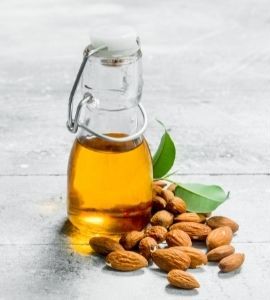
Since safflower oil is non-comedogenic, people use it to improve their skin condition and keep it moisturized. But if you are out of it, you can use almond oil and get the same results!
Almond oil is obtained from, yes, you guessed it right, almonds. Nearly half of the dried almond weight is due to its oil content. When almonds ripen, they are pressed to extract oil.
Since unrefined almond oil cannot withstand heat, it must not be used for cooking. Instead, it can be used to nourish and moisturize the skin. Apart from that, you can use it to heal minor cuts and wounds, along with psoriasis and eczema.
With its Vitamin A content, it works on acne, aging signs, and scars. You can also use it as a massaging oil for a soothing and relaxing experience.
Due to its antifungal properties, rubbing almond oil on ringworm can get you visible results in no time.
Refined almond oil can be added to meat, vegetables, salads, cream soups, etc. You can also use it for baking cakes, cookies, and muffins, owing to its nutty and toasted taste.
Almond oil is a healthy substitute since it boosts immunity, maintains healthy cholesterol levels, and reduces the risk of heart diseases.
Best for Skincare and Cooking (but not at high temperatures).
5. Vegetable Oil

Vegetable oils are nothing but plant-based oils. They could either be obtained from canola, palm, soybean, sunflower, etc. You can also find several vegetable oils obtained from herbs.
You can easily substitute safflower oil with vegetable oil due to its mild flavor. This makes it easier to incorporate this oil into your cooking without affecting its overall aroma or taste.
Apart from deep-frying and sautéing, you can use vegetable oil in place of butter or lard in greasing the pan. Since it is cheap, you can use it daily without worrying about a dent in your budget.
However, vegetable oil is not as healthy as other oils since there is an imbalance between omega 3 and 6. This can lead to several heart diseases. But you can prevent this by using vegetable oil in moderation.
Best for Cooking and Greasing.
6. Canola Oil

If baking is where your heart lies, you can substitute safflower oil with canola oil to get the most delicious baked goods.
Canola oil is a vegetable oil obtained from rapeseed oil. With 460 °F of smoke point, you can use it for cooking and baking.
Since it has a mild flavor and smooth texture, you can use it for stir-frying, grilling, sautéing, etc. It also works as a great addition to marinades and sauces.
As far as baking is concerned, canola oil is the most preferred choice by the top bakers of the work. It does not affect the taste of the cake in any manner. Instead, it helps enhance other cake flavors, like vanilla and chocolate.
For no reason, Canola oil is not regarded as one of the healthiest oils. It contains low amounts of saturated fat, but it is rich in monosaturated fat. Such a composition helps maintain cholesterol levels.
Moreover, with its rich Vitamin composition, you can reduce the appearance of acne, fine lines, spots, etc. Moreover, it also reduces joint pain and inflammation. This can be done by mixing canola oil with the essential oil of your choice and applying it all over your body.
Best for Baking and Skincare.
7. Coconut Oil
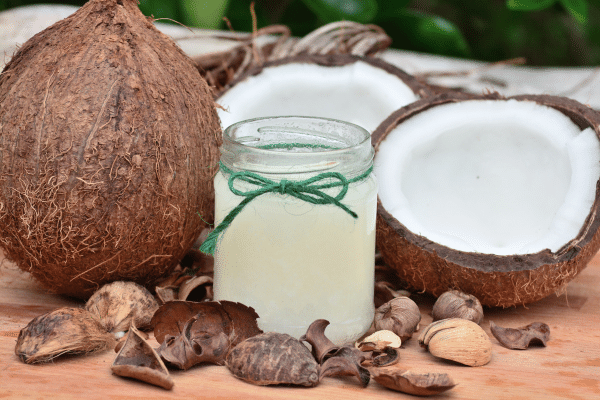
While olive oil takes the prize when it comes to soap-making, coconut oil is nothing less than a strong competitor. Soaps made with coconut oil provide rich lather along with immense moisturization.
As the name suggests, coconut oil is fetched through the extraction process of the coconut kernel via wet or dry milling.
As opposed to its name, coconut oil does not have any flavor of coconut. Instead, it has a neutral taste which makes it a preferred choice for soap-making as well as cooking.
With its 350°F smoke point, you can easily use coconut oil for stir-frying, baking, or sautéing. A little bit of it will be more than enough to cook meat and vegetables.
You can also use it on your hair for stronger and healthier growth. Applying it to your skin will keep it moisturized and hydrated, even on humid or cold days.
It protects the skin from UV rays, prevents skin irritation, improves cognitive function, and promotes better metabolism.
Best for Soap-making, Cooking, Baking, Haircare, and Skincare.
8. Grapeseed Oil

Grapeseed oil is an exceptional alternative to safflower oil, especially if you are looking for better skin care.
Grapeseed oil is a vegetable oil obtained from grape seeds. It is a by-product of the winemaking industry since it was considered nothing more than wine waste before its health benefits came to light.
While grapeseed oil has a high smoke point (421 °F), it is not advisable to be used for deep-frying due to its polyunsaturated fatty acids content. Instead, it can be used as a salad dressing. Its light, nutty, and fruity flavor can raise any salad to a gourmet level.
You can also use it for baking or preparing waffles or pancakes.
As we mentioned earlier, grapeseed oil is exceptional for skincare since it prevents the clogging of the pores. Instead, it leaves the skin moisturized without making it seem oily.
Other than that, it also reduces inflammation and effectively works on acne scars.
It also helps reduce inflammation and prevent heart diseases and the formation of blood clots.
Best for Skincare and Baking.
9. Hazelnut Oil

Hazelnut oil is the oil extracted from hazelnuts through a press machine. While it is most commonly used for hair and skin care, you can use it as a finishing oil for salad dressings.
With its nutty and earthy flavor, you can use hazelnut oil for baking, grilling, roasting, or sautéing. It is not the best safflower oil substitute for deep-frying. Regardless, adding it to your salads can enhance your salads.
Since hazelnut oil contains oleic acid, you can use it as a moisturizer. Not only does it make it soft and supple, but it also keeps the skin visibly clear and clean.
Best for Skincare and Cooking (but not frying).
10. Flaxseed Oil

Flaxseed or Linseed oil is obtained from ripened flax seeds through pressing and solvent extraction.
This colorless/yellowish oil has a nutty flavor. However, it must not be used for cooking due to its low smoke point.
However, you can add it to your dog’s food to improve their health. It can reduce the symptoms of lower blood pressure, arthritis, or kidney issues. Moreover, adding it to your dog’s regular diet can improve their coat and make it shiny.
You can also use it to improve your skin and make it look healthier and moisturized. It helps prevent the sagging of the skin and makes it tight and youthful.
Best for Skin Care and Preparing Dog Food.
11. Corn Oil

Corn oil is obtained from the corn germ through a screw or hydraulic press. Due to its high smoke point (450 °F), corn oil is used for frying, stir-frying, grilling, etc.
Corn oil has a buttery flavor, making it a chef’s favorite for baking. Apart from that, you can also use corn oil as salad oil.
Studies also suggest that corn oil is beneficial for dogs since it works as a fat source for them. Not only is it highly digestible, but it also does not affect the bowel movements of dogs.
You can use corn oil in your day-to-day cooking since it helps control cholesterol levels, reduce inflammation, prevents chronic diseases, and relieves allergies.
Best for Cooking and Preparing Dog Food.
12. Groundnut Oil

While it might be on the pricier end of oils, groundnut oil can elevate your baking to a new level of deliciousness.
Groundnut oil, also referred to as peanut oil, is extracted from the edible seeds of the peanut plant. Since the seeds develop underground, it is mainly referred to as groundnut oil.
Groundnut oil has a mild and nutty flavor, with hints of sweetness. With its pleasing aroma, you can use groundnut oil for cooking and baking without worrying about changing the course of your dish.
Apart from frying and sautéing, groundnut oil is a fantastic substitute for safflower oil for baking cookies, cakes, and muffins. Due to its subtle savory notes, you can create an array of baked goods, something that your entire family will devour in a few minutes.
Best for Cooking and Baking.
13. Avocado Oil
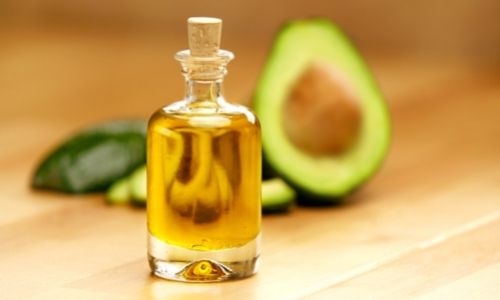
If you want some level of creativity in your kitchen, we recommend trying avocado oil.
Avocado oil is extracted from the avocados’ pulp. Due to its high smoke point, it can be used for cooking all kinds of recipes. You can also consume it raw by drizzling some over your salad or adding it to your smoothies. Its nutty and grassy flavor will add freshness to your recipes.
Apart from stir-frying, air-frying, and sautéing it, you can use avocado oil for skin care. It helps soothe irritated and chapped skin since it hydrates and replenishes it from within.
Since this oil is high in oleic acid, Vitamin A, and other soluble vitamins, you can use this oil to reduce bad cholesterol.
Best for Cooking, Baking, and Skincare.
14. Wheat Germ Oil

Wheat germ oil might not be a huge part of your daily diet, but it holds an integral position in the cosmetic industry. This is due to its moisturizing capabilities that significantly improve the skin’s condition.
The omega-3 fatty acids in wheat germ oil make the skin softer and supple. It also reduces the formation of fine lines and wrinkles.
While it is not recommended for deep-frying, you can use this oil as a salad dressing due to its nutty and toasty taste. It also works with pasta and vegetables.
Best for Skincare.
15. Apricot Kernel Oil

Apricot kernel oil is obtained from the kernels of Apricots. While apricot oil can be used for cooking due to its sweet and nutty taste, it is predominantly used for skincare.
With its light texture, this oil penetrates quickly into the skin and heals it from within. It improves the skin tone and reduces the appearance of fine lines, blemishes, and face wrinkles.
You can also use this oil to treat acne, inflammation, dark circles, and under-eye puffiness.
Best for Skincare.
Related Questions
Can I use safflower oil every day?
As far as it is consumed in moderation, safflower oil is a healthy choice of oil. Since overconsumption can cause issues for people with bleeding disorders, it is best not to consume more than 1.5 tablespoons of safflower oil daily.
Is safflower oil safe for breastfeeding?
It is best to avoid high doses of safflower oil during pregnancy and breastfeeding period since babies get the necessary omega-6 fatty acids from breast milk. So, messing up with the baby’s diet is not advisable.
Final Note
Drastically changing your oils can be overwhelming, be it for cooking, baking, haircare, skincare, soap-making, etc. But when it comes to substituting safflower oil, you need not worry about dealing with any changes in terms of texture, taste, or aroma. Replacements like sunflower oil, olive oil, and coconut oil can help you work without feeling any changes.
Choose as per our suggestions, and we’ll see you in the next blog!



